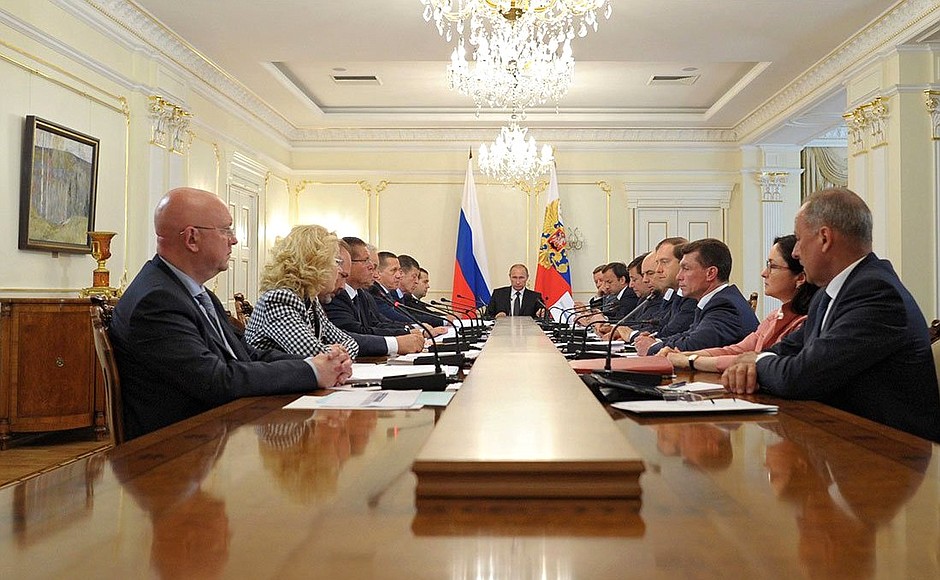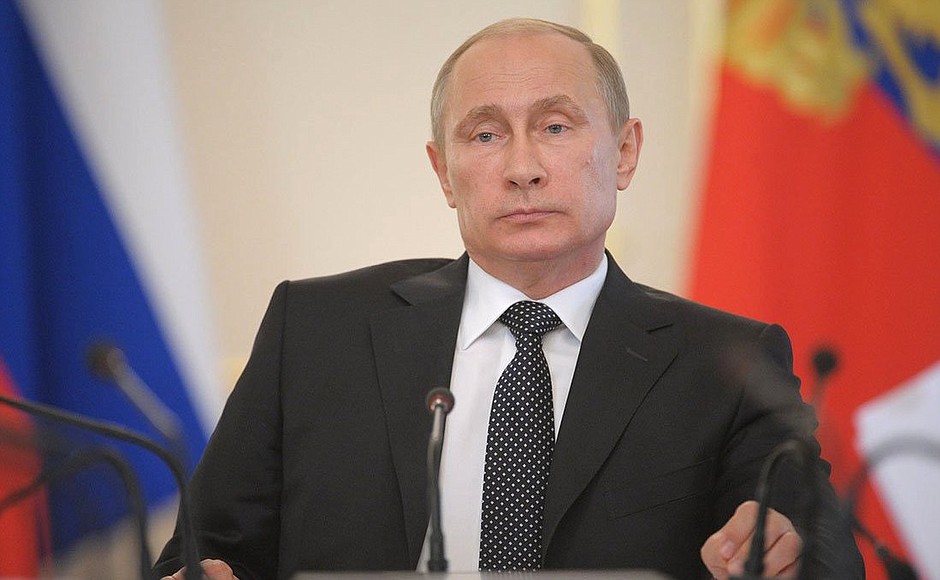The results of the meeting on clean-up effort following flooding in southern Siberia and the meeting with internet industry representatives, both held the previous day, were also discussed.
Gas supplies to Ukraine were discussed as a separate item.
* * *
President of Russia Vladimir Putin: Good afternoon, colleagues,
We are here to discuss a number of issues that we can resolve effectively if we combine the efforts of the Presidential Executive Office, the Government, and the Central Bank. These issues include access to foreign markets, support measures for our exports, and project financing mechanisms. But before we turn to the main items on our agenda, let me make a few remarks and make a request of the Government.
The first remark concerns the energy talks we have been holding with our Ukrainian partners, talks that have not been easy. Energy Minister Alexander Novak and Gazprom CEO are meeting with our Ukrainian partners, with European Commissioner Mr Oettinger acting as intermediary. Gazprom has proposed our Ukrainian partners exactly the same conditions as it offered Viktor Yanukovych’s government: a discount on the contract price of $100, which makes a final price of $385 per 1,000 cubic metres of gas. Let me note here that neighbouring countries, Poland and a few others, receive gas at a higher price but using the same method for obtaining this price, namely, reducing the export duty on gas. We used exactly the same method when we settled this matter with Viktor Yanukovych’s government too.
As we understand the situation, our Ukrainian partners are worried that this discount could be unilaterally cancelled as easily as it was offered. We have never acted in this way. We have always shown the utmost reliability in respecting our contracts. But I nevertheless ask the Government and the Prime Minister to look at what could be done at the government level or through our agreements with the Ukrainian government to cement these conditions and make them absolutely reliable and unchanging for an agreed period.
Judging by information we are getting from the parties involved, it is not even these mechanisms that are the issue. The issue is that our Ukrainian partners find these discounts insufficient and want more, though it is not very clear on what grounds. But if this is the case, then this whole affair looks to be deliberately heading for a dead end.
I have already made several appeals to our European partners to support this negotiating process, which we are carrying out with the greatest openness and transparency possible. I think that our offer is made in a more than genuine spirit of partnership aimed to help and support the Ukrainian economy as it traverses this difficult time. But if our offers are rejected, events will reach a completely different stage. This is not our choice and we do not want this, but if this is the way things go, then we will live in this new dimension.
(Addressing Prime Minister Dmitry Medvedev) Mr Medvedev, I ask you to keep this in mind and organise further work as we agreed.
Prime Minister Dmitry Medvedev: We will do this of course. We will draw up our government proposals in the form of long-term discounts that we are offering even though our own economy is not going through the easiest time at the moment and these discounts do have an impact on us too and are quite painful. But Ukraine’s economy is in an even more difficult situation, and so, for the sake of supporting our Ukrainian partners, we are ready to do what you have asked.
At the same time though, rather than talking about the ‘traps that Russia is setting’, our partners in the Ukrainian government should remember that they have unpaid gas debts and that at any moment we could bring in prepayment for gas supplies, and as you rightly said, this would indeed be a completely different stage in our gas relations.
Vladimir Putin: That’s agreed then.
The situation is rather strange of course, because the contract currently in force was signed a long time ago, and by the very same people who are working in the government today. Simply, they at some point along the way suddenly decided to renounce it. It’s strange, but such are the facts.
Let’s work and we will see what comes. In order to support Ukraine’s economy and, to be honest, in order not to lose a customer, which is also important, we will act as we propose to our customers, that is to say, we will be open, honest, and as transparent as possible in our actions. Judging from what we see, a number of our European partners do understand the fairness of our position. Let’s see what results the talks bring today or tomorrow and in the coming days. We have agreed that we will not introduce prepayment before June 16 of this year, not before Monday, in other words.
As for the routine items, as you know, I met yesterday with internet industry representatives, and I must say that this was a very substantive and interesting meeting. The sector representatives made a number of concrete proposals for improving the legal base in this area. The aim is to make the internet business more effective. They have drafted concrete proposals on option agreements, convertible loans and so on. They have even drafted proposals for amending some articles and making addenda to the Civil Code and other laws. The idea is for internet businesses to be able to benefit from the same conditions as their colleagues and competitors abroad. We will summarise all of this and I ask the Government to examine all of these proposals. They are concrete in nature and I think they are very useful.
Yesterday, as you know, we also examined the situation following the flooding in southern Siberia. In this respect, I want to hear from [Chairwoman of the Accounts Chamber] Ms Golikova on the results of the audit conducted of mechanisms for issuing and using housing certificates in 2012 and 2013. I know that there have been some problems in this area that we must address.
<…>

